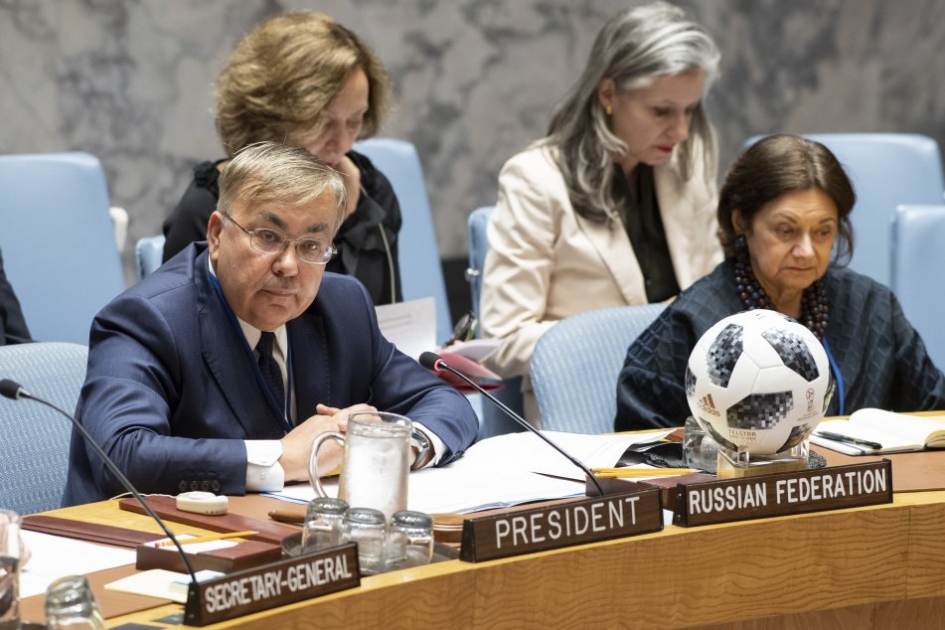Right of reply by Deputy Foreign Minister Sergey Vershinin at the Security Council meeting on Maintenance of international peace and security (Near and Middle East and South Africa)
In his most recent report (S/2018/614) on the implementation of resolution 2334 (2016), the Secretary-General rightly points out that regional conflicts are interconnected, something that many other speakers have talked about today. He also says that the Israeli-Palestinian conflict is iconic, and its persistence helps to fuel the extremist agenda.
I fully agree with Mr. Guterres when he says that is precisely why it is critically important to create conditions that will enable us to bring the parties back to substantive negotiations. In that regard, I would once again like to recall our initiative to hold an Israeli-Palestinian summit in Russia and our proposal to send a Security Council mission to the region.
The effort to mobilize the Middle East Quartet of international mediators is becoming ever more pertinent. We firmly believe that the starting point for our collective work should be through ensuring strict adherence by all to the international legal foundations formulated by the Security Council for resolving this issue, refraining from taking unilateral steps, including building settlements in the occupied territories, and ending the violence.
That is the only way we will be able to open up the prospects for a two-State solution by negotiating a package of final status issues. The humanitarian situation in Gaza must be improved and under the control of a legitimate Palestinian Government. The efforts to unite Palestinians must also be intensified.
The conflicts in Syria and Yemen are also awaiting lasting settlements of their own. Russia and the other guarantors of the Astana process have made a genuine contribution to stabilizing the situation in Syria and ensuring that it will not fall to terrorists. We now have an opportunity to focus on the political process under the auspices of the United Nations in Geneva, for which we need constructive efforts on the part of all the external stakeholders. At the same time, as stipulated in the decisions of the Security Council and various international formats, we must continue to relentlessly combat terrorism until it is completely stamped out in Syria.
I have listened carefully and respectfully to all of those who have spoken so far, including to the representatives of the United Kingdom and the United States, who expressed particular concern about what is happening in the south-western de-escalation area in Syria. In fact, active peace negotiations are under way there with the opposition groups that have rejected the terrorists, while the fight against the terrorists themselves continues.
I want to emphasize that the Russian Federation is firmly committed to meeting its obligations, including those related to the ceasefire regime. No one has done more than Russia and its co-guarantors of the Astana process to bring about a ceasefire and reduce the level of violence, and certainly none of the countries whose money and weapons give aid to illegal armed groups.
I would like to point out that the de-escalation areas, including the one in south-western Syria, which Russia set up in coordination with the United States and Jordan, were certainly not created in order to break up a State Member of the United Nations or perpetuate the presence of terrorists there. However, I regret to say that we have been compelled to conclude that at the moment more than 40 per cent of the south-western area’s territory continues to be controlled by Jabhat Al-Nusra and the Islamic State in the Iraq and the Levant (ISIL), which, as we are all well aware, have been designated terrorist groups by the Organization.
There can be no ceasefire between us and them. At the same time, we have to once again regretfully point out that in the year that has passed since the establishment of the de-escalation zone in south-western Syria, the United States, in spite of the commitments it undertook, has done nothing to support the fight against the terrorists there.
On the Yemen crisis, I reiterate that there can be no military solution to the conflict. We can reach a longterm settlement only by taking into account the opinions of all of its participants. Russia is maintaining contact with all the opposing sides and assisting the Special Envoy of the Secretary-General for Yemen, Mr. Martin Griffiths.
There is no question that special attention needs to be paid to resolving the severe humanitarian and food crisis there. Significant international efforts are required to get the political process in Libya moving so as to unite the country, create unified governmental institutions and put an end to internecine clashes. Much more also remains to be done to help Iraq overcome the consequences of the war with ISIL and achieve sustainable national reconciliation.
In conclusion, I would like to express the hope that today’s debate will contribute to finding ways to strengthen peace and stability in the Middle East and North Africa.
